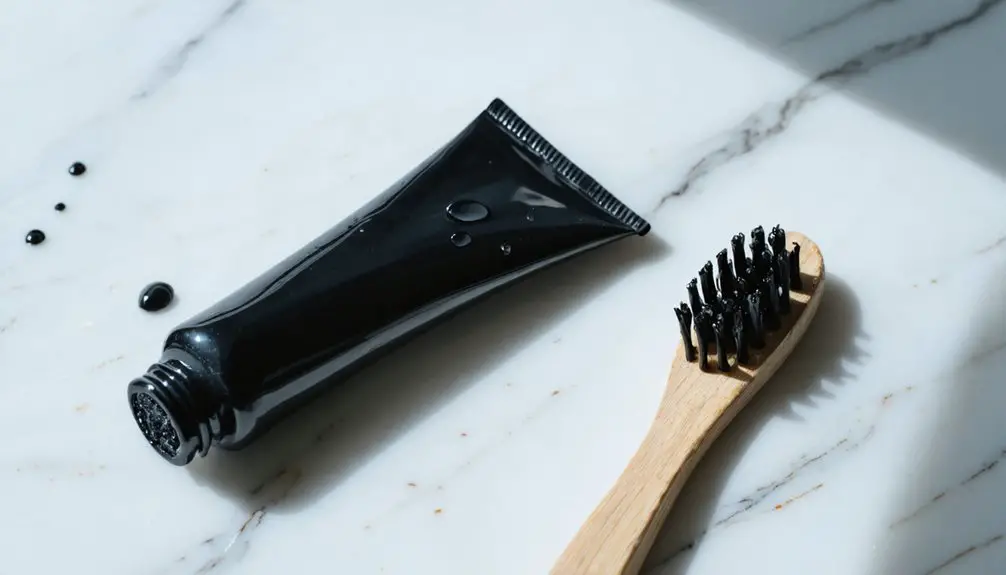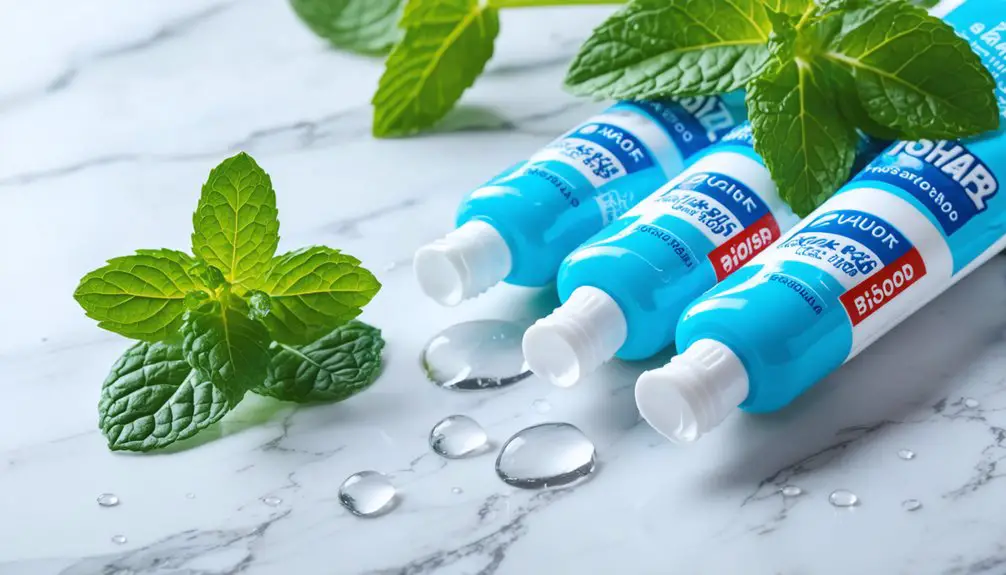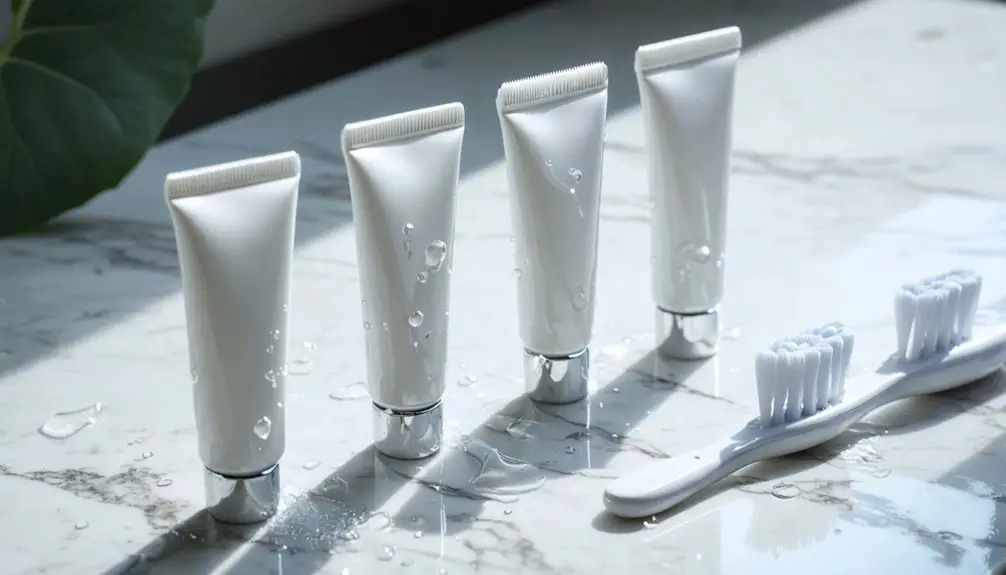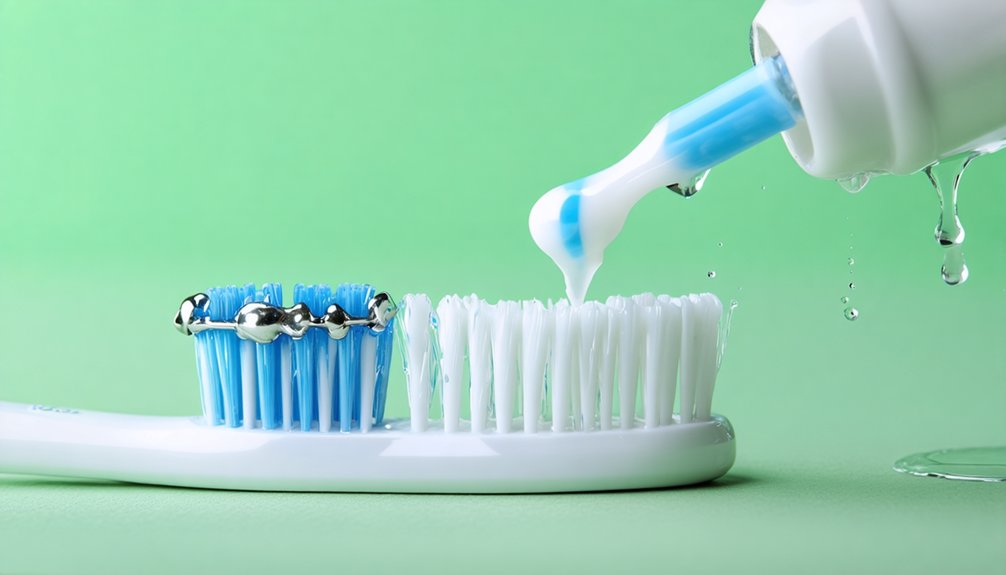You’ll find several trusted charcoal toothpaste options for teeth whitening, including Hello Oral Care’s vegan formula and FineVine’s sensitive teeth blend. These products work by absorbing surface stains through microscopic pores while providing mild abrasive action. For safe and effective results, limit usage to twice weekly to prevent potential enamel erosion. While activated charcoal can help remove external stains from coffee and tea, understanding its limitations and safety considerations will help you make an informed choice.
Key Takeaways
- Crest’s charcoal toothpaste leads consumer satisfaction with over 16,000 five-star ratings and proven whitening effectiveness.
- Hello Oral Care provides a vegan-friendly charcoal formula that safely removes surface stains through natural absorption.
- FineVine charcoal toothpaste offers gentle whitening specifically formulated for people with sensitive teeth.
- Cali White combines activated charcoal with organic coconut oil to enhance stain removal and whitening results.
- Twin Lotus charcoal toothpaste features triple-action bacteria fighting while removing coffee, tea, and tobacco stains.
What You Need to Know About Activated Charcoal in Toothpaste
While activated charcoal has gained popularity as a tooth-whitening ingredient, it’s essential to understand how this substance actually works in toothpaste formulations. The ultra-fine charcoal particles contain microscopic pores that trap and absorb surface stains from beverages like coffee and tea, functioning similarly to a filter or sponge.
You’ll find that activated charcoal works through two main mechanisms: absorption of surface impurities and mild abrasive action on your tooth enamel. Many dentists recommend twice weekly use to maintain safe and effective results. Scientific studies have shown limited evidence supporting charcoal’s whitening capabilities compared to other agents.
However, it’s significant to recognize that it only removes extrinsic stains through physical means rather than chemically altering tooth color.
For your oral health, consider that while charcoal can effectively polish teeth, its abrasive nature may potentially thin enamel if used excessively, and its high absorbency could reduce the benefits of fluoride in your toothpaste.
Best Charcoal Toothpaste Brands and Their Features
A growing number of charcoal toothpaste brands have emerged in the market, each offering distinct formulations and benefits for oral care. Among the top contenders, Hello Oral Care stands out with its vegan, cruelty-free formula, while FineVine caters to those with sensitive teeth.
Twin Lotus delivers triple-action bacteria fighting capabilities, and Cali White combines activated charcoal with organic coconut oil for enhanced results. Users typically experience noticeable whitening effects within 10 days of consistent use.
You’ll find charcoal benefits across these leading brands, including natural stain removal and breath freshening properties. Crest’s charcoal formula has earned over 16,000 five-star ratings from satisfied customers. Many manufacturers prioritize eco-friendly packaging, with Tom’s of Maine leading sustainability efforts through B Corp certification.
While these products offer gentler alternatives to chemical whitening agents, they’re formulated to maintain enamel health and provide daily cleaning power, making them suitable for regular use in your oral care routine.
Safety Considerations When Using Charcoal Toothpaste
Despite charcoal toothpaste‘s rising popularity, significant safety concerns have emerged regarding its long-term effects on oral health.
The highly abrasive nature of activated charcoal can cause irreversible enamel erosion, exposing the yellowish dentin beneath and increasing your risk of tooth sensitivity and decay.
Many consumers are drawn to charcoal toothpaste as a natural alternative to conventional products.
You’ll also need to take into account the fluoride deficiency in most charcoal toothpastes.
Without this essential mineral, you’re losing vital protection against cavities, especially if you consume sugary or acidic foods.
The charcoal particles can accumulate in your gum line and between teeth, potentially staining dental work and causing gum irritation.
The American Dental Association has found no scientific evidence supporting charcoal toothpaste’s effectiveness for whitening teeth.
If you’re thinking about using charcoal toothpaste, it’s important to consult your dentist first, as there’s limited scientific evidence supporting its safety and effectiveness for regular use.
How Charcoal Toothpaste Actually Whitens Your Teeth
Understanding the whitening mechanism of charcoal toothpaste requires examining its dual action: physical adsorption and mechanical abrasion.
Through adsorption mechanisms, the highly porous charcoal particles bind to chromophores, those pesky staining molecules on your tooth surface, allowing you to brush them away effectively.
The surface abrasion component works as charcoal particles physically scrub away external stains during brushing.
Charcoal’s tiny particles act like microscopic scrubbers, physically removing surface stains as you brush your teeth for a cleaner appearance.
However, you’ll find charcoal’s whitening effect is primarily limited to extrinsic stains from coffee, tea, wine, and tobacco.
Unlike peroxide-based whiteners, charcoal won’t chemically bleach intrinsic discoloration or alter your tooth’s internal color.
While it’s effective for maintaining whiteness and preventing new stains, you shouldn’t expect dramatic whitening results comparable to chemical treatments. Due to lack of evidence, many dental professionals remain skeptical about charcoal’s long-term effectiveness.
The effects are typically temporary and focus on surface-level cleaning.
Real Results and Consumer Experiences
Clinical studies and consumer experiences reveal a significant gap between marketing claims and real-world results of charcoal toothpaste. While you’ll notice some surface stain removal, real results show whitening effects comparable to regular fluoride toothpaste, with no significant advantage for deeper staining.
Consumer feedback consistently highlights several concerns you should consider. You’ll notice that stains on restorations can become permanent with charcoal use. You’ll likely encounter black residue around dental work, and many users report increased tooth sensitivity with regular use.
The abrasive nature of charcoal can lead to enamel wear and gum recession over time. Though some users note temporary improvements in breath freshness after dental cleanings, long-term satisfaction rates remain low compared to peroxide-based alternatives. A recent systematic review shows activated charcoal’s whitening effect comes primarily from its abrasive properties rather than any inherent bleaching capability.
Additionally, the lack of fluoride in many formulations may leave your teeth more vulnerable to decay.
Frequently Asked Questions
Can I Use Charcoal Toothpaste While Wearing Braces or Dental Implants?
You shouldn’t use charcoal toothpaste with braces or implants due to safety concerns. It’s too abrasive, can damage orthodontic components, and particles may lodge in braces, compromising your maintenance routine.
How Long Should I Wait After Teeth Cleaning Before Using Charcoal Toothpaste?
You should wait 24-48 hours after teeth cleaning before using charcoal toothpaste to reduce teeth sensitivity. Limit brushing frequency to occasional use rather than daily to protect your enamel.
Does Charcoal Toothpaste Stain Bathroom Sinks or White Clothing?
While charcoal stains can be managed, you’ll find that it does stain sinks and white clothing. You’ll need regular cleaning with specialized products and should protect your clothes during brushing.
Can Children Safely Use Charcoal Toothpaste Products?
You shouldn’t let children use charcoal toothpaste due to major safety concerns. Pediatric dentistry experts warn it can damage developing enamel, lacks protective fluoride, and may irritate young gums.
Should I Brush With Regular Toothpaste After Using Charcoal Toothpaste?
Yes, you’ll want to brush with regular toothpaste after charcoal toothpaste to get essential toothpaste ingredients like fluoride. This maximizes charcoal benefits while protecting your enamel from potential abrasive damage.
References
- https://www.rankandstyle.com/top-10-list/best-charcoal-toothpastes
- https://studyfinds.org/best-charcoal-toothpaste/
- https://www.consumerreports.org/health/dental-oral-care/does-charcoal-toothpaste-work-a7477277301/
- https://www.cnet.com/health/personal-care/why-best-charcoal-toothpaste-may-not-exist/
- https://penndentalmedicine.org/blog/does-charcoal-toothpaste-work/
- https://applewellnessdental.ca/apple-wellness-dental-explains-is-charcoal-toothpaste-safe/
- https://gulhanemedj.org/articles/charcoal-containing-toothpastes/gulhane.galenos.2021.43153
- https://pmc.ncbi.nlm.nih.gov/articles/PMC8095700/
- https://pmc.ncbi.nlm.nih.gov/articles/PMC12109725/
- https://ijodontostomatology.com/wp-content/uploads/2023/09/2023_v17n3_018.pdf



